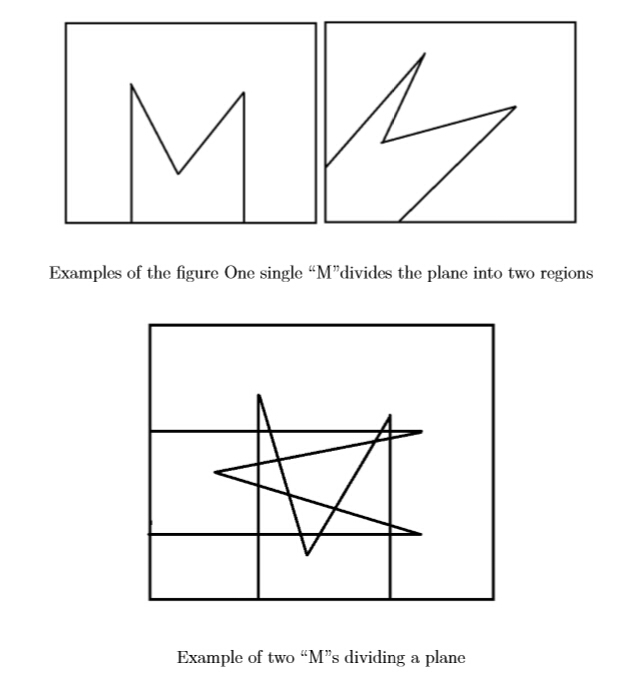Sawtooth
Time Limit: 2000/1000 MS (Java/Others) Memory Limit: 65536/65536 K (Java/Others)
Total Submission(s): 422 Accepted Submission(s): 134
Problem Description
Think about a plane:
● One straight line can divide a plane into two regions.
● Two lines can divide a plane into at most four regions.
● Three lines can divide a plane into at most seven regions.
● And so on...
Now we have some figure constructed with two parallel rays in the same direction, joined by two straight segments. It looks like a character “M”. You are given N such “M”s. What is the maximum number of regions that these “M”s can divide a plane ?

● One straight line can divide a plane into two regions.
● Two lines can divide a plane into at most four regions.
● Three lines can divide a plane into at most seven regions.
● And so on...
Now we have some figure constructed with two parallel rays in the same direction, joined by two straight segments. It looks like a character “M”. You are given N such “M”s. What is the maximum number of regions that these “M”s can divide a plane ?

Input
The first line of the input is T (1 ≤ T ≤ 100000), which stands for the number of test cases you need to solve.
Each case contains one single non-negative integer, indicating number of “M”s. (0 ≤ N ≤ 1012)
Each case contains one single non-negative integer, indicating number of “M”s. (0 ≤ N ≤ 1012)
Output
For each test case, print a line “Case #t: ”(without quotes, t means
the index of the test case) at the beginning. Then an integer that is
the maximum number of regions N the “M” figures can divide.
Sample Input
2
1
2
Sample Output
Case #1: 2
Case #2: 19
Source
其实题目已经很清楚的告知我们是有线条分平面引申而来的了....
对于线条分平面
0 1
1 1 +1
2 1+1 +2
3 1+1 +2+3
4 1+1 +2+3+4
............
n 1+n(n+1)/2;
那么对于一个m型号的模型,其实我们可以将其视其为四条线段组合而成,这样这个公式就变为:
4n*(4n+1)/2 +1 ---->显然得到的答案有余坠,我
0 1
1 11 2 9
2 37 19 9*2
......
推到得到:
4n*(4n+1)/2 +1 -8*n----> 8n^2-7n+1
代码:

1 #include<cstdio> 2 #include<cstring> 3 char aa[50],bb[50]; 4 int ans[50]; 5 int mul( char *a, char *b, int temp[]) 6 { 7 8 int i,j,la,lb,l; 9 la=strlen(a); 10 lb=strlen(b); 11 12 for ( i=0;i<la+lb;i++ ) 13 temp[i]=0; 14 for ( i=0;i<=la-1;i++ ) { 15 l=i; 16 for ( j=0;j<=lb-1;j++ ) { 17 temp[l]=(b[j]-'0')*(a[i]-'0')+temp[l]; 18 l++; 19 } 20 } 21 while ( temp[l]==0 ) 22 l--; 23 for ( i=0;i<=l;i++ ) { 24 temp[i+1]+=temp[i]/10; 25 temp[i]=temp[i]%10; 26 } 27 if ( temp[l+1]!=0 ) 28 l++; 29 30 while ( temp[l]/10!=0 ) { 31 temp[l+1]+=temp[l]/10; 32 temp[l]=temp[l]%10; 33 l++; 34 } 35 if ( temp[l]==0 ) 36 l--; 37 return l; 38 } 39 void cal(__int64 a,char *str) 40 { 41 int i=0; 42 while(a>0) 43 { 44 str[i++]=(a%10)+'0'; 45 a/=10; 46 } 47 } 48 int main() 49 { 50 int cas; 51 __int64 n; 52 scanf("%d",&cas); 53 for(int i=1;i<=cas;i++) 54 { 55 scanf("%I64d",&n); 56 printf("Case #%d: ",i); 57 if(n==0)printf("1 "); 58 else 59 { 60 memset(aa,'�',sizeof(aa)); 61 memset(bb,'�',sizeof(bb)); 62 memset(ans,0,sizeof(ans)); 63 //,(8*n-7)*n+1 64 cal(8*n-7,aa); 65 cal(n,bb); 66 int len=mul(aa,bb,ans); 67 ans[0]++; 68 int c=0; 69 for(int j=0;j<=len;j++) 70 { 71 ans[j]+=c; 72 if(ans[j]>9) 73 { 74 c=ans[j]/10; 75 ans[j]%=10; 76 } 77 } 78 if(c>0) 79 printf("%d",c); 80 for(int j=len;j>=0;j--) 81 printf("%d",ans[j]); 82 printf(" "); 83 } 84 } 85 return 0; 86 }
